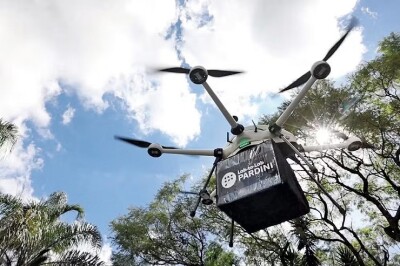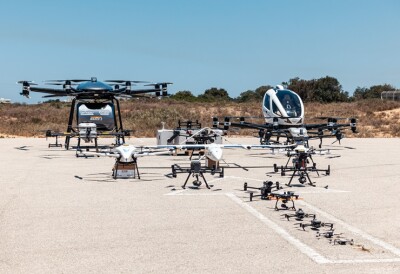Speedbird Aero, a pioneering name in the drone technology sector, proudly announces a groundbreaking achievement in the realm of unmanned aerial systems (UAS).  On February 29, 2024, the Brazilian National Civil Aviation Agency (ANAC) granted Speedbird Aero the Approval of Exemption from Article E94.103(a) for its DLV-1 and DLV-2 aircrafts. This marks a historic moment for Speedbird as the first company in Latin America certified to manufacture and operate UAS capable of transporting UN 3373 - Category B Biological Substances.
On February 29, 2024, the Brazilian National Civil Aviation Agency (ANAC) granted Speedbird Aero the Approval of Exemption from Article E94.103(a) for its DLV-1 and DLV-2 aircrafts. This marks a historic moment for Speedbird as the first company in Latin America certified to manufacture and operate UAS capable of transporting UN 3373 - Category B Biological Substances.
ANAC’s Article E94.103(a) prohibits the transportation of dangerous goods or cargo in unmanned aircraft. This prohibition extends to UN 3373 Category B Biological Substances, including critical medical items such as disease and blood tests, organs for transplant, vaccines and more.
Prior to this certification, Speedbird Aero was already facilitating the transportation of surgical equipment, medicines, and medical kits in partnership with Grupo Hermes Pardini, now integrated into Grupo Fleury, one of the country’s largest medical laboratories with 8,000 collection points. In 2021, Pardini and Speedbird Aero collaborated to establish the lengthiest beyond visual line of sight (BVLOS) corridor within a prominent urban setting, aimed at optimizing the swift collection, delivery and processing of laboratory samples. This 30 kilometers-long corridor was equipped with numerous droneports strategically positioned throughout the capital city of Salvador. With this new approval, Speedbird Aero aims to further expand medical transports by drone with Grupo Fleury.
Cleber Miranda, Corporate Logistics Manager at Grupo Fleury, shared his perspective on this momentous accomplishment: "This project began in 2021 with a clear objective: to obtain authorization to transport biological materials. There have been three years of continuous efforts in this search and we can consider it a great milestone. This approval will allow us to expand transport through drones, reducing costs while allowing us to achieve our mission: to bring quality healthcare to our customers wherever they are. Without a doubt, it will open doors to new possibilities that previously seemed unattainable."

“For Speedbird Aero, securing approval to commence unmanned flight operations involving UN3373 biological substances is the culmination of years of unwavering dedication,” explained Manoel Coelho, the company’s co-founder and CEO. He continued, “Through rigorous efforts, we have diligently showcased the safety and efficacy of our aircraft systems and daily operational protocols. Our journey encompassed over 22,000 meticulously executed flights on our platform. This milestone holds profound significance, transcending beyond the boundaries of Brazil. The decision to launch our company in Brazil was intentional, recognizing the nation's unique blend of urban complexities and rural challenges.”
Brazil, a microcosm of global diversity, mirrors contrasting landscapes and infrastructural dynamics on a condensed scale. Its urban hubs boast unparalleled development, with thoroughfares adorned with heliports that outnumber bus stops. São Paulo alone hosts a staggering 200 heliports and claims the world's largest fleet of helicopters. Moreover, Brazil ranks second globally in terms of private aircraft ownership, presenting formidable obstacles to unmanned aircraft operations without meticulous planning and coordination.
The vast expanse of Brazil's territory poses logistical hurdles, particularly evident in its rural expanses. The limitations of existing road networks underscore the pressing need for innovative solutions. Unmanned aircraft promise to bridge these logistical chasms, offering swift and efficient transport alternatives. However, navigating Brazil's busy airspace presents additional complexities, further underscoring the need for comprehensive planning.
Coelho said, “In scenarios involving critical cargo such as lab samples, blood supplies, and medications, convenience takes a back seat to the imperative of efficient and punctual deliveries. In these vital endeavors, timely transportation can be a matter of life and death, highlighting the paramount importance of our mission.”
Speedbird Aero's meticulous planning entailed rigorous adherence to Brazilian certification processes akin to those followed by civil airlines. The company’s arduous journey to certification serves as a testament to its unwavering dedication to advancing the capabilities of UAS in the service of humanity. By adhering to stringent standards, Speedbird Aero not only ensures the safety and reliability of its operations but also demonstrates its commitment to upholding the highest levels of quality and compliance in the aviation industry. This commitment extends beyond national borders, serving as a testament to Speedbird Aero's dedication to advancing the capabilities of UAS while prioritizing safety and regulatory compliance.
The certification holds profound implications for global healthcare logistics. By enabling the transport of vital medical supplies to areas with limited access, Speedbird Aero is poised to revolutionize medical logistics while promoting sustainable transportation models. While this latest certification is currently valid in Brazil, Speedbird Aero anticipates the possibility of utilizing the same documents and tests for certification under other regulatory agencies, including in the United States and Europe.
In addition to this approval, Speedbird Aero is also currently spearheading initiatives like the BR-UTM (Brazilian Unmanned Traffic Management). Its role extends beyond manufacturing and operation of drones, to all facets essential to realizing the seamless integration of drone logistics networks across both urban and rural landscapes.
For media inquiries or further information, please contact Eloisa Rios at [email protected].
About Speedbird Aero
About Grupo Fleury
Source: Speedbird Aero
















Comments